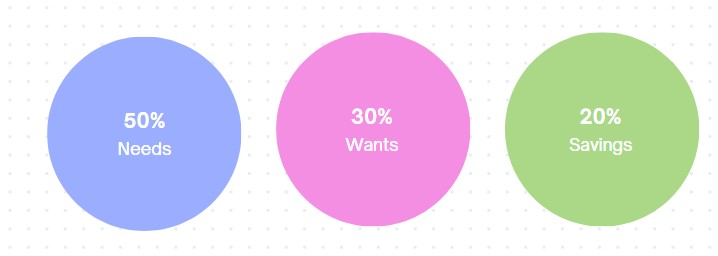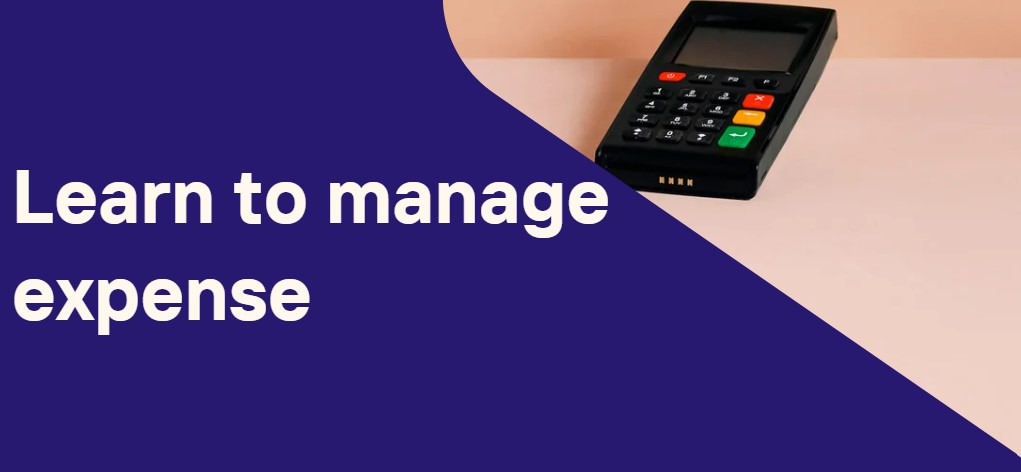Managing your expenses wisely can help you save more for future needs and emergencies. Usually, people spend more time learning about ways to grow their income and develop new sources of income and investments that can give higher yields in the future. However, learning ways in which you can reduce your expenses smartly can make you richer day by day.
In this article, we will learn some basic tips and rules that can help you manage your daily expenses easily.
Illustration to understand how important it is to manage expenses
To understand the importance of expense management, let us see how changes in your daily expenses can bring huge differences in your portfolio growth.
case1
Monthly income = $2000
Expense = $1600
Saving = $400
Now assuming constant income for 5 years and savings being invested at 7% ROI (which is very generous if done with basic knowledge of investing) your portfolio after 5 years will be $28,637.
case2
Monthly income = $2000
Expense = $1500
Saving = $500
Now if you just manage to cut 5 % in your expense then your portfolio after 5 years will be $35,796 which is 25% higher than case 1. So, saving just 5% more each month can make you 25% richer in just 5 years. Now you can very well imagine its effect in the long term.
Develop the habit of budgeting
The very first step you must learn is budgeting. Budgeting can help you keep track of your expenses and can make it easy to analyze where most of your money is going. The main purpose of budgeting is to know how much you are earning, how much you are spending, and how much are you spending on various heads like insurance, utilities, groceries, food, etc. Though there are various digital tools available to facilitate easy budgeting, you can use Excel or even a notepad and a pen to prepare it.
Steps to make a budget
Write down your monthly income
If you are on regular payroll then listing your income is an easy task, just write down your monthly income. However, if you are self-employed, a freelancer, or your monthly income is dynamic then you can write your average monthly income for the last three months (which you can update at the end of the month)
Write down your expenses
Before recording your expenses, first create these nine categories: Phone bills, debt repayment, groceries, health, utilities, dining out, pets, transport, and others. Now you can keep updating this sheet on a regular basis. I would suggest you update your cash expenses daily because they are much harder to record and easily forgotten. You can update your expenses via online payment on a weekly basis.
Sample expense record
Category | Week 1 | Week 2 | Week 3 | Week 4 | Week 5 | Total (category-wise) |
Groceries | ||||||
Health | ||||||
Phone bills | ||||||
Debt repayment | ||||||
Utilities | ||||||
Dining out | ||||||
Pets | ||||||
Transport | ||||||
others | ||||||
Total |
| |||||
Budgeting in this way can simplify analyzing the areas where you are spending more and areas where you can put efforts to minimize expenses.
Calculate your monthly saving
Talking numerically, saving is income minus expenses. But here we want to focus more on category-wise saving and how much scope each category has left, where you can consider cutting down some expenses. Obviously, there are certain areas where you cannot think of reducing expenses like health insurance, utilities, groceries, transport, and mortgage. These expenses are called necessities.
But you should attempt to reduce your expenses in certain areas like clothing, gym and clubs, entertainment, home décor, alcohol, eat-outs, etc. These expenses are considered as wants.
3 Tips that can help you improve your spending habits
Once you have prepared your budget, you can easily analyze which areas you are spending more and figure out ways to reduce it. But believe me it’s not that easy to change spending habits. Follow these three tips which can surely make it easy for you to control your expenses.
Make a list before going shopping
Having a list before going shopping can make you more focused on your needs and can control temptations spurred by commercial techniques used by stores to lure you to buy beyond your affordability.
Make a plan before big purchases
Before making any purchase with more than 10% of your monthly income, make sure to do thorough research online or by visiting a store about your specific needs and what product will suit you. It is often seen that if you directly buy it, you end up buying a higher specification product at a higher price which may be completely unnecessary.
Develop the habit of sharing your expense
You should regularly share your expenses with some of your close friends or family members. This method can help you get some valuable feedback which may help you to improve your spending habits.
50:30:20 rule
This method is one of the most famous budgeting rules due to its simplicity in managing expenses. This method involves dividing your net salary (after tax) into three parts. The first part which accounts for 50% should be used to meet needs. The second part which accounts for 30% should be used to fulfill your wants and the third part which accounts for 20% should go into your savings account or investment.

Needs (50% of your income)
These expenses are of high priority like utilities, healthcare, transport, rent, childcare, etc. Though there is not much scope for trimming here you must very clear understanding of your needs e.g., your rent may be too high compared to your financial status. In such cases, you should consider relocating and finding a cheaper residence that is also nearer to your workplace. This way can not only reduce your housing expense but also your transport expense as well.
Wants (30% of your income)
Wants are not necessities but are an important part of life. You often want to enjoy vacations, have good clothes, appliances, and furniture, and go to movies, spas, and clubs occasionally.
Savings (20% of your income)
20% of your income should go to savings. Saving necessarily does not mean saving a bank account. It could include good debt like student loans or mortgages and contributions toward retirement funds.
Reduce your debts
Having a lot of bad debts can be very troublesome for you. These bad debts can reduce your share of savings in that 20% of the 50:30:20 rule. You have to compromise on savings, good mortgages, and retirement contributions due to bad debts.
Reducing your debt is not that difficult if handled with proper strategy. What you have to do is make the cut of 5% in your wants and use it to pay extra on your current debts. The interesting fact is that next month your debt liabilities will not be the same because of that extra repayment. Next month, with that 5% cut on want and reduced liability you can further make extra repayment. If you keep on repeating this method you can easily win over your debt traps.
You can also consider taking personal loans at lower interest rates to pay off all your higher APR debts like credit cards. One consolidated debt is much easier to manage.
Another effective method you can use is to channel all your savings to pay debts with the highest APR first. It saves you on a higher interest rate.
28:36 rule
This rule helps you understand how much debt you can take so that there will not be any trouble in repayment. This rule states that you can’t spend more than 28% of your monthly income on your mortgage and not more than 36% of your monthly income on total debt including mortgage and all other loans like car loans, credit cards, personal loans, etc.
If overall monthly debt repayment is more than 36% of your monthly income, you might not sustain and are likely to default.
For, if your monthly income $2000, then you can plan to have monthly mortgage of $560 and overall monthly loan repayment of $720.
Use your credit cards wisely
Credit cards can increase your expenses if not used with discipline as they can induce temptation to buy unnecessarily and overspend. And if you lag repaying your credit card bill then APR is also very high which further adds to your monthly expense. You may also end up paying late fees along with damaging your credit score. Thus, must consider using credit cards with discipline. Here are some tips for using credit cards wisely:
- Spend only on purchases which can you can afford
- Never use too many credit cards as it is difficult to keep track.
- Always keep your credit utilization below 30% as a thumb rule.
